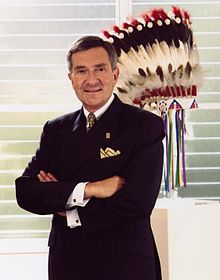Walter Richard "Rick" West Jr. (born January 6, 1943) is the president and CEO of the Autry Museum of the American West in Los Angeles.[1] He was the founding director of the Smithsonian National Museum of the American Indian,[2] retiring from the position in 2007. He is also a citizen of the Cheyenne and Arapaho Tribes in Oklahoma and a Peace Chief[3] of the Southern Cheyenne.[4] His professional life has been devoted to serving the American Indian community on cultural, artistic, educational, legal and governmental issues.[2][4]
W. Richard West Jr. | |
|---|---|
 | |
| Born | Walter Richard West Jr. January 6, 1943 |
| Spouse | Mary Beth Braden |
| Children | 2 |
Background
editBorn in San Bernardino, California, West grew up in a log cabin in Muskogee, Oklahoma.[5] He is the son of Maribelle McCrea West, a Baptist minister's daughter of Scottish-American background and the late Walter Richard West Sr. (1912–1996).[5] His father, "Dick" West, was a well-respected Cheyenne painter, who chaired the art department at Bacone College.[6]
Richard West earned a bachelor of arts degree in American history, graduating magna cum laude in 1965 and graduated Phi Beta Kappa from the University of Redlands in California.[2] He also received a master's degree in American history from Harvard University in 1968. West graduated from Stanford Law School with a doctor of jurisprudence degree in 1971, where he also was the recipient of the Hilmer Oehlmann Jr. Prize for excellence in legal writing and served as an editor and note editor of the Stanford Law Review.[2]
Professional career
editWest was a partner in the Washington, D.C., office of Fried, Frank, Harris, Shriver & Jacobson, and, subsequently, in the Indian-owned Albuquerque law firm of Gover, Stetson, Williams & West, P.C.[2] During his law career, West served as both a general counsel and special counsel to a wide range of tribes and non-tribal organizations, before tribal, state, and federal and tribal courts.[7] He also represented clients before several executive departments of the U.S. Federal Government and the Congress.[4]
During his tenure in the Smithsonian, the Washington Post exposed his lavish travel expenses and a gala farewell celebration.[8] This is part of a general crackdown on Smithsonian expenses by the General Accounting Office. West has stated that the travel was for museum business and approved by supervisors. After conducting an investigation at the request of the United States Congress, the Smithsonian Institution's inspector general found that West "should have exercised better judgment." West has agreed to reimburse the Smithsonian $9,700.[9] The Smithsonian Office of the Inspector General, A. Sprightley Ryan, published a 42-page report on October 28, 2008 responding to media reports and congressional requests.[10]
From 2007 to 2010, West served as the Vice President of the International Council of Museums.[11] In 2011, he was appointed as the Interim Director for the Textile Museum in Washington D.C.[12] Since 2011, he has served on the board of directors of the Native Arts and Cultures Foundation.[13] In 2012, the Association of Tribal Archives, Libraries, & Museums (ATALM) honored West with a Guardians of Culture and Lifeways International Award[14] and the Autry Museum of the American West designated West as the new President and CEO.[15]
Personal life
editWest married Mary Beth Braden, a fellow Stanford graduate. She is the professor of political science at the National Defense University, Industrial College of the Armed Forces. Together they have two adult children, Amy and Ben.[4]
References
edit- ^ "Autry president W. Richard West Jr. Embodies American complexity". May 2013.
- ^ a b c d e "Biography: W. Richard West Jr." Ford Foundation (Retrieved 16 Jan 09)
- ^ Belcher, Steve. "'Cheyene Justice' exhibit on display." Clinton Daily News. 18 May 2005.
- ^ a b c d "W. Richard West." Department of the Interior [1] (retrieved 16 Jan 09)
- ^ a b "A Warrior in Washington" Stanford Magazine (Retrieved 17 Jun 12)
- ^ Jones, Ruthe Blalock. "West, Walter Richard Sr. (1912–1996)." Oklahoma Historical Society's Encyclopedia of Oklahoma History & Culture (retrieved 16 Jan 09)
- ^ Miranda, Carolina A. (June 29, 2021). "How Rick West helped shift the love-hate dynamic between Indigenous people and museums". Los Angeles Times. Retrieved July 2, 2021.
- ^ Grimaldi, James V. "'Lavish' Spending Not Found Elsewhere At Smithsonian." Washington Post. 30 Oct 2008 (Retrieved 16 Jan 09)
- ^ Former Director to pay Smithsonian, New York Times, Oct. 30, 2008
- ^ Office of the Inspector General Response to Congressional Requests, W. Richard West, Travel and Expense - Full Report [2]
- ^ "W. Richard West – Sites of Conscience". www.sitesofconscience.org. Retrieved May 15, 2014.
- ^ "Textile Museum in Washington appoints W. Richard West, Jr. as Interim Director". artdaily.com. Retrieved May 15, 2014.
- ^ http://www.nativeartsandcultures.org/about-foundation/our-board Archived 2009-04-24 at the Wayback Machine NACF Board of Directors. Accessed 5/14/14.
- ^ http://theonefeather.com/2012/05/nacf-board-members-to-be-honored/ Cherokee One Feather, "NACF Board Members to Be Honored," (5/1/12). Accessed 5/14/15.
- ^ Los Angeles Times Los Angeles Times. Accessed 5/15/14.
External links
edit- "W. Richard West Jr. biography" (PDF). Archived from the original on March 7, 2008. Retrieved September 25, 2013.
{{cite web}}: CS1 maint: unfit URL (link) from National Museum of the American Indian site - W. Richard West Jr. interview. Audio recording.
- Native paths: American Indian art from the collection of Charles and Valerie Diker, an exhibition catalog from The Metropolitan Museum of Art (fully available online as PDF), which contains an essay by W. Richard West Jr.